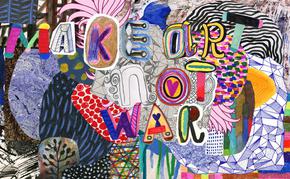The views expressed in our content reflect individual perspectives and do not represent the official views of the Baha'i Faith.
How couldst thou forget thine own faults and busy thyself with the faults of others? – Baha’u’llah, The Hidden Words, p. 10.
The term “politically correct” seems notoriously hard to define. Maybe that’s because the definition depends entirely on your social or political point of view.
Here’s one definition of “political correctness:” privileged, smug, entitled elitists telling ordinary folks how to think and what they can say. If you subscribe to this definition, you may also believe political correctness has “run amok”—the two words most associated with it in web searches.
Here’s a competing definition: a refusal to tolerate racism, misogyny and bigotry. If you subscribe to this definition, you may also believe that political correctness has become a coded phrase for hate.
These warring definitions transcend the English language. In German, for example, the newly-coined word “gutmensch”—which literally means “do-gooder”—actually defames tolerance and helpfulness as stupid and naïve. Many other languages now have similar words or phrases, all of them derogatory.
Have our cultures become so polarized that we can’t even agree on the definition for a commonly-used phrase? Apparently, they have. Even worse, have we become so jaded and cynical that we’ve now invented terms that categorize and criticize those who try to be kind to others? Apparently, we have. That should give us pause, and make us stop, think and re-assess where we’re headed.
When this kind of thing happens, historians and scholars warn, society begins to break down. Competing discourses mean that various factions begin to recognize completely different sets of facts, narratives and lived realities. Those realities eventually clash, and ultimately weaken, damage or destroy the previously-unified society.
Perhaps that pronounced polarization occurs because we no longer have a shared code of ethics and behavior. When a society splits itself in two or simply disintegrates, that’s often the case. For example, in America’s Civil War—which most historians agree was fought over slavery—the country disagreed violently on the ethics of owning slaves. In that era, even the definitions of words and phrases differed, depending on which side of the Mason-Dixon dividing line you lived. Those huge differences eventually led to war—the worst war in the country’s entire history.
In every other civil war, a similar process usually takes place. Differing definitions spark conflict, and differing worldviews generate distrust and hatred. Different values lead to polarized societies; and eventually those societies break apart, sometimes violently.
Many of the world’s countries have now split themselves into culturally-divided nations based on how people live. The so-called “elite”—the well-educated, relatively wealthy, generally “un-churched” professional and powerful class, who live primarily in urban areas; hold a very different set of perceptions and views from the so-called “ordinary folk”—the working class, less educated, more religious rural and ex-urban population. You can see that dynamic reflected in voting patterns, media consumption patterns and even in patterns of thought and belief. Once it occurs, how do we bridge the great gulf between those polarized populations?
From a Baha’i perspective, only one solution exists as a remedy for this pronounced polarization: the unity that comes from a shared spiritual value system. No civilization can cohere for long without that underpinning of shared values. The Baha’i teachings foresee a global civilization eventually developing in the world—and that new, emerging planetary culture will need a set of universal values in order to function well. Baha’is offer the world the spiritual values taught by Baha’u’llah and Abdu’l-Baha:
Blessed is he who is charitable, for he shall inherit eternal life. Blessed is he who overlooks the faults of others, for he shall enjoy divine beatitude. Blessed is he who associates with all with joy and fragrance, for he has obeyed the commands of Baha’u’llah. Blessed is he who loves mankind, for he has heeded the advice of Baha’u’llah. Blessed is he who is kind to his enemies, for he has walked in the footsteps of Christ.
Blessed is he who proclaims the doctrine of spiritual brotherhood, for he shall be the child of light. Blessed is he whose heart is tender and compassionate, for he will throw stones at no one. Blessed is he who will speak evil of no one, for he hath attained to the good pleasure of the Lord. Blessed is he who will not uncover the sins of others, for he will become favoured at the threshold of the Almighty.
Blessed is he who hath a forgiving nature, for he will win the spiritual graces of God. Blessed is he who diffuses only the sweet fragrance of the flowers of friendship and mutual association, for he will obtain a goodly portion of the bounties of the Merciful. Blessed is he who teaches union and concord, for he will shine like unto a star in heaven.
Blessed is he who practices loving-kindness and co-operation, for he will be encircled with celestial benedictions. Blessed is he who comforts the downtrodden, for he will be the friend of God. – Abdu’l-Baha, from the Diary of Mirza Ahmad Sohrab, written to Miss Harriet Magee, May, 1913, Star of the West, Volume 4, pp. 38-39.
Let’s recap: the values Abdu’l-Baha lists here are charity; overlooking others’ faults; unity; love and kindness. He recommends “spiritual brotherhood,” a tender and compassionate heart, a kindly tongue and a sin-covering eye. The Baha’i teachings praise a forgiving nature, a friendly demeanor, and anyone “who teaches union and concord.” If we practice loving-kindness and cooperation, Abdu’l-Baha promises us, and comfort the downtrodden, we will receive bountiful spiritual rewards.
If that’s politically correct or “gutmensch,” then sign me up.

















Comments
Sign in or create an account
Continue with Facebookor